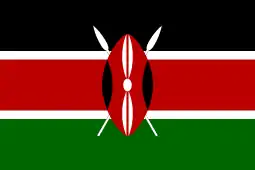Tachoni
The Tachoni (meaning "We shall be back") are Kalenjins who were assimilated by the Luhya people of Western Kenya, sharing the land with the Bukusu tribe. They live mainly in Webuye, Chetambe Hills, Ndivisi (of Bungoma County) Matete sub-county and Lugari sub-county in Kakamega County. Most Tachoni clans living in Bungoma speak the Lubukusu' dialect of the Luhya language, and they are subsequently often mistaken as Bukusus. They spread to Trans-Nzoia County especially around Kitale, and to Uasin Gishu County near Turbo, Eldoret. Among the Tachoni clans are Abakobolo, Abamuongo, Abamarakalu, Abangachi, Abasang'alo, Abasamo, Abayumbu (mostly around Webuye), Abamuchembi, Abachambai, Abacharia, Abakabini, Abamakhuli, Abasioya, Abaabichu, Abamachina, Abamutama, Abakafusi, Abasonge, Abasaniaka, Abaabiya, Abakubwayi, Abachimuluku. Note that the morpheme 'aba' means 'people'. The Abakhusia/abasamo of Kabras are also Tachonis who speak Kikabras.
| Part of a series on the |
| Culture of Kenya |
|---|
 |
| Cuisine |
|
Circumcision
The tribe is rich in beliefs and taboos. The most elaborate cultural practice they have is circumcision.
The Tachoni practice circumcision in August of every even year. When the boys are circumcised, they go hunting in the village's forest for birds and guineafowl (likhanga), and a meal is prepared for them when they return in the evening. Most meals for initiates are rich in protein and Ugali (a staple-food across Kenya, which is called 'Obusuma' in Tachoni) in order to replace blood lost during the circumcision.
The Tachoni tribe believe in 'okhulicha' (rites of passage [the training of initiates in adult roles before they are considered to be adults]). The boys are taken to 'Esitabicha' where they are taught adult behavior. They are told secrets of the community which they are not to reveal to anyone. This is done by elderly members of the Tachoni community who have undergone the same ritual. They are taught Tachoni beliefs, philosophy, values and practices.
Circumcision practices distinguish the Tachoni from the Bukusu whose practice ist quite different. For instance, during circumcision, Tachoni boys face towards the East as they are circumcised whereas Bukusu boys face the West. Linguistically, the two tribes understand each other.
Economy
The Tachoni practice farming as well as the rearing of cattle. A few engage in business.
Politics
Notable politicians among the Tachoni include Alfred Wekesa Sambu of Webuye, Dr. Noah Wekesa of Kwanza in Trans Nzoia, long-serving Councillor & Webuye Mayor and Current Minority Leader Kakamega County Assembly - John Mweyi Ngome, Amos Kaburu[Educationist] and Nabii Nabwera {Council of Governors}. Those who have died include: Johnstone Welangai - former Malava large constituency and former high commissioner of Kenya to Uganda; Munialo Matianyi, the first Chief of Mawe Tatu and a close confidant of Alfred Wekesa Sambu; former minister of state and secretary general of KANU Burudi Nabwera, Dr Noah Wekesa - former minister for tourism and wildlife and chairman of Jubilee Party; and Professor Everret Standa - a former vice chancellor of Kenyatta University and chairman of the commission of higher education.
Peter Buruti Sifuma Namisi, Welangai Masinde in the (legislative council ) & Burudi Nabwera are the legends of Tachoni politics. Don't forget Wasike Binyenya (omumwalie)as well.
Dialects
The various Luhya tribes speak several related languages and dialects, though some of them are no closer to each other than they are to neighboring non-Luhya languages. For example, the Bukusu people are ethnically Luhya, but the Bukusu dialect is a variety of Masaba. However, a core of mutually intelligible dialects comprise Luhya proper:
- Hanga (OluWanga)
- Tsotso (OluTsotso)
- Marama (OluMarama)
- Kisa (OluShisa)
- Kabras (LuKabarasi)
- East Nyala (LuNyala)
See also
References
- Demmahom, Olovodes Lihraw (2010). The Tachon peoples of Kenya: history, culture and economy. Nairobi: PERC-PACE International. ISBN 9789966967015.
- Nakitare, Maurice Munasie Situma (1991). "A pre-colonial history of Abatachoni, 1500-1900 A.D.: A study in socio-cultural change (Doctoral Thesis)". University of Nairobi.
